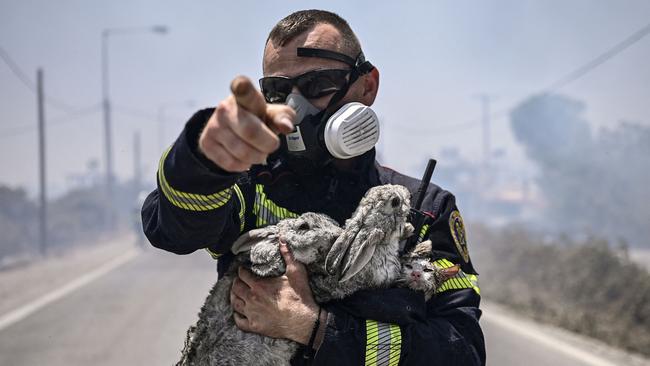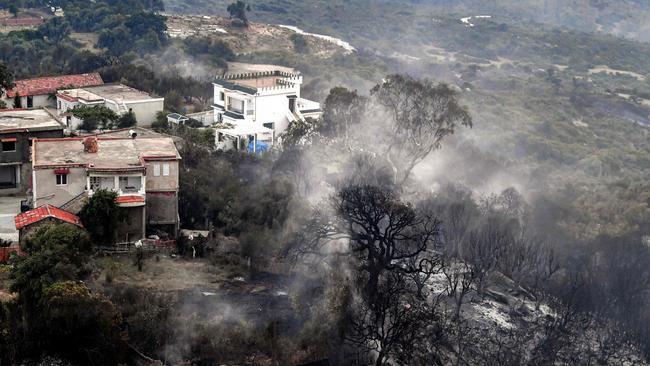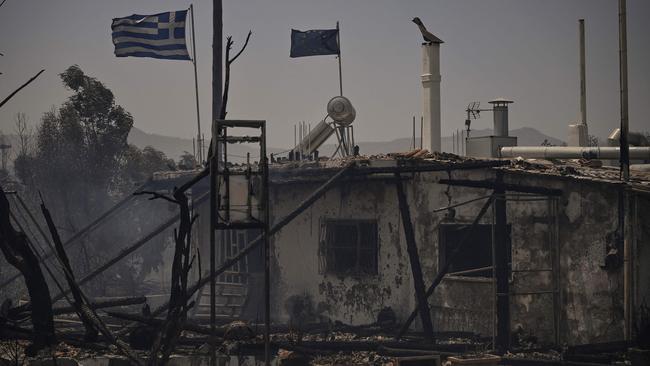No respite as heatwave fans fatal fires across Mediterranean
Bushfires raging across North Africa and southern Europe during a blistering heatwave have killed dozens of people and forced mass evacuations.

Bushfires raging across North Africa and southern Europe during a blistering heatwave have killed dozens of people and forced mass evacuations.
As temperatures hit 48C in parts of Algeria on Monday, the country recorded 97 blazes across 16 provinces, fanned by strong winds.
The fires killed at least 34 people, including 10 soldiers, as they raged through residential areas.
Across the Mediterranean, Greek Prime Minister Kyriakos Mitsotakis told parliament: “We are at war and are exclusively geared towards the fire front” as rescuers rushed to evacuate thousands of people on the tourist islands of Rhodes and Corfu.
He said the nation faced “another three difficult days ahead” before high temperatures were forecast to ease.
Tens of thousands of people had already fled blazes on Rhodes since the weekend, with many frightened tourists scrambling to get home on evacuation flights.
Fires were also burning on Greece’s second largest island of Evia. Vassilis Kikilias, Greece’s civil protection minister, said crews had battled more than 500 fires around the country for 13 straight days.

Scientists rank the Mediterranean as a climate-change “hot spot”, with the UN’s Intergovernmental Panel on Climate Change warning of more heatwaves, crop failures, droughts, rising seas and influxes of invasive species.
In Algeria, more than 1500 people were evacuated from the Bejaia, Bouira and Jijel provinces east of the capital Algiers. The three provinces in Algeria’s Mediterranean coastal region have seen the worst of the fires.
The interior ministry said 7500 firefighters and 350 firetrucks were mobilised with aerial support to fight the flames on Monday.
Fires regularly rage through forests and fields in Algeria in summer, and this year have been exacerbated by the heatwave
In neighbouring Tunisia, temperatures on Monday neared 50C as the state energy supplier planned power cuts in a bid to preserve the network’s performance.
At least 300 people were evacuated by sea and by land from the village of Melloula, and there was extensive damage near the town of Nefza, about 150km west of the capital Tunis.
In a new rapid analysis of the scorching temperatures, scientists from the World Weather Attribution group found that the heatwaves in Europe and North America would have been almost impossible without climate change.
Temperatures in China were made 50 times more likely by global warming, they found.
“The role of climate change is absolutely overwhelming,” said climate scientist Friederike Otto, of the Grantham Institute for Climate Change and the Environment, Imperial College London.
To trace how far the July heatwaves in the northern hemisphere had departed from what would have been expected without that warming, Professor Otto and her WWA colleagues used weather data and computer model simulations to compare the climate as it is today with that of the past.
Professor Otto said in the past it would have been “basically impossible” that such severe heatwaves would happen at the same time and that people should no longer be surprised to see temperature records tumbling.
The researchers found that these severe heatwaves can now be expected about once every 15 years in North America, every 10 years in southern Europe and every five years in China.
And they would become even more frequent – happening every two to five years – if temperature rise reached 2C.

Several travel companies have halted their inbound tourist flights to Rhodes, and have been helping to ferry foreigners home.
“We ran 10km with all our luggage to escape the flames”, while the temperature was 42C, said German tourist Lena Schwarz, after arriving at Hanover airport on Monday. The 38-year-old said the journey leaving Rhodes was “hell on Earth”.
Italian officials held crisis talks on Monday on how to manage blackouts in Sicily that have left hundreds of thousands of people without electricity and water for days during a searing heatwave.
The mayor said the city had been “brought to its knees” by rolling power cuts.
A heatwave that started more than a week ago has yet to ease in Sicily, where the local civil protection agency reported 47.6C in Catania on Monday.
AFP



To join the conversation, please log in. Don't have an account? Register
Join the conversation, you are commenting as Logout